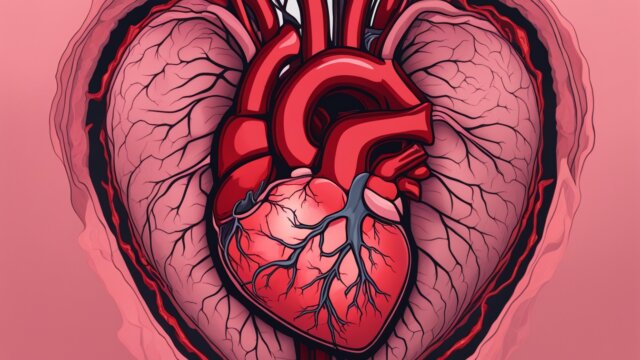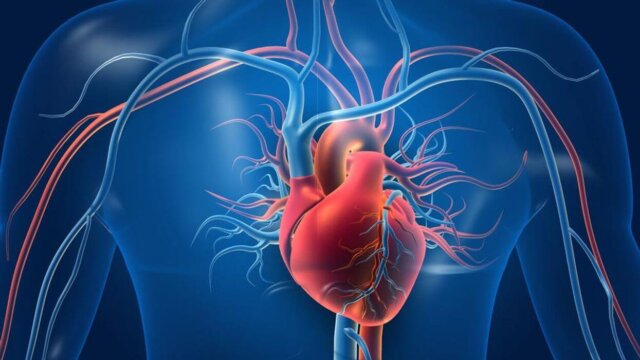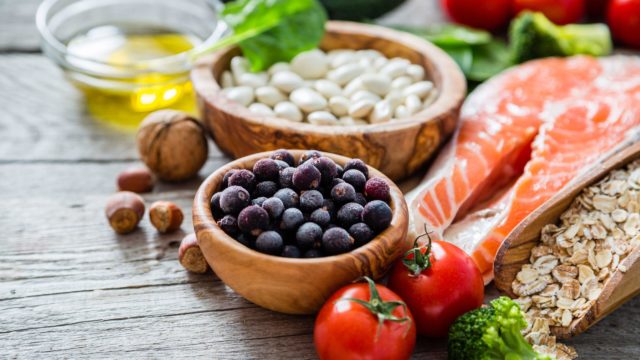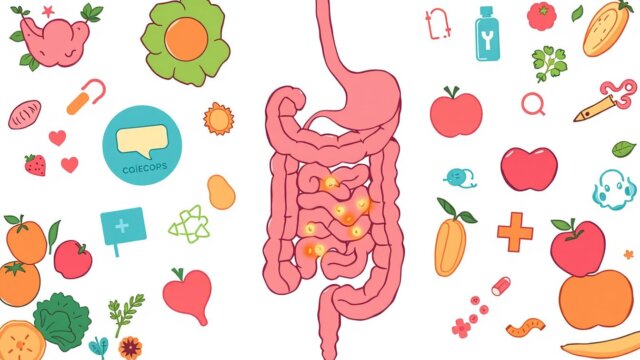FTC disclaimer: This post may contains affiliate links and we will be compensated if you click on a link and make a purchase.
Each person has about 200 different types of bacteria, viruses, and fungi in their gut. This mix, called the “gut microbiome,” is crucial for health. A varied gut microbiome can lower risks for diseases like diabetes, IBD, and psoriatic arthritis.
The gut microbiome is an ecosystem in your intestines. It’s getting more attention from doctors. Studies show links between gut health and many health issues. These include mental health problems, autoimmune diseases, and even cancer. Keeping your gut microbiome diverse and healthy is important for your overall well-being.
Key Takeaways
- Each person carries about 200 different species of bacteria, viruses, and fungi in their digestive tract.
- A diverse gut microbiome may help reduce the risk of conditions like diabetes, inflammatory bowel disease, and psoriatic arthritis.
- Poor gut health can lead to symptoms like upset stomach, skin conditions, autoimmune challenges, and fatigue.
- Lifestyle changes such as reducing stress, getting enough sleep, and consuming prebiotics or probiotics can improve gut health.
- Eating high-fiber foods, garlic, fermented foods, and collagen-boosting foods can promote the growth of beneficial gut bacteria.
Understanding the Gut Microbiome
Everyone has over 200 types of good and bad bacteria, plus viruses and fungi in their gut. Many of these tiny organisms are good for us. They may lower the risk of diseases like diabetes and arthritis.
What is the Gut Microbiome?
The gut microbiome is made up of trillions of microorganisms in our digestive system. These include bacteria, viruses, and fungi. They’re important for our health, affecting everything from how our immune system works to our metabolism.
This area is growing in interest for doctors and researchers. They want to learn more about the gut microbiome and its effects on our health.
Importance of a Healthy Gut Microbiome
A flourishing gut microbiome is key to staying healthy. Scientists are studying its complexity and its link to overall health. A healthy gut is linked to better mental and physical health.
Good gut health affects our mental and physical well-being. It’s linked to mental health issues, autoimmune and digestive diseases, heart problems, and even cancer.
Impact of Gut Health on Overall Well-being
The gut microbiome is very important for our health. It affects our immune system, how we digest food, and even our minds. When the gut is out of balance, it can lead to many health problems.
Keeping our gut healthy and diverse is crucial for our health. It affects both our body and mind.
Signs of an Unhealthy Gut
Many things today can harm your gut’s good bacteria. These include too much stress, not enough sleep, junk food, and antibiotics. Which can mess with your health in many ways, affecting your immune system, hormones, weight, and risk of diseases.
Digestive Issues
If your gut is not healthy, you might feel it in your stomach. Symptoms can be gas, bloating, constipation, diarrhea, and heartburn.
Weight Fluctuations
Changing weight without trying could signal a problem. An unhealthy gut might not absorb nutrients right, affecting weight.
Sleep Disturbances and Fatigue
Bad gut health can mess up your sleep or leave you tired. A study found tired people are often those with IBS, a gut issue. Around most of our body’s serotonin, which helps with mood and sleep, is made in the gut. So, gut health is key for good sleep.
Skin Irritation
If you have gut issues, your skin might show it too. Acne, eczema, and psoriasis are skin problems linked to bad gut health.
Autoimmune Conditions
Bad gut bacteria could lead to autoimmune diseases. These include thyroid issues, arthritis, MS, and type 1 diabetes. If your gut is not well, you might notice autoimmune diseases as signs.
Food Intolerances
Food issues could point to an unhealthy gut. Symptoms like bloating, pain, and diarrhea suggest a problem.
Headaches might link to gut issues too. Frequent headaches could mean your gut and brain are not communicating well. This could also lead to feeling anxious or depressed.
Lifestyle Changes for Gut Health
Maintaining a gut-friendly lifestyle is vital. It helps have a healthy microbiome. Managing stress is key. High stress levels can harm our gut. Stress can change our gut bacteria’s balance. To lessen stress, do mindfulness practices. Meditation, yoga, or deep breathing help. Also, activities like walking or enjoying time with family can help.
Importance of Quality Sleep
Getting enough good sleep is crucial for gut health. It also helps us sleep better. Aim for 7-8 hours of sleep each night. This is essential for your gut and well-being.
Mindful Eating Habits
Eating mindfully is good for your gut. Chew your food well and eat slowly. This can help prevent obesity and diabetes. It also aids in making healthier food choices. Such habits can keep your gut healthy and minimize stomach issues.
Staying Hydrated
Drinking enough water is linked to better gut bacteria variety. Being well-hydrated is good for your whole body. It’s a key part of a gut-friendly life.

Probiotics and Prebiotics
Research shows a prebiotic or probiotic supplement might help your gut health. Prebiotics work as a ‘food’ for good gut bacteria. Probiotics are those good bacteria.
But, if you’re really sick or have a weak immune system, it’s wise to avoid probiotics. Not all probiotics on the market are good for you. Always talk to a doctor before picking a probiotic or prebiotic supplement to boost your health.
Prebiotic Benefits | Probiotic Benefits |
|---|---|
Can help with calcium absorption, maintain healthy gut lining cells, and decrease rates of constipation. | Introduce new healthy bacteria to the gut, leading to benefits such as improved digestion, increased vitamin and mineral production, and reduced inflammation. |
Remember, supplements for prebiotics and probiotics are not tightly watched by the U.S. FDA. So, do your homework and chat with your doctor. This ensures the supplement you select is safe and right for you.
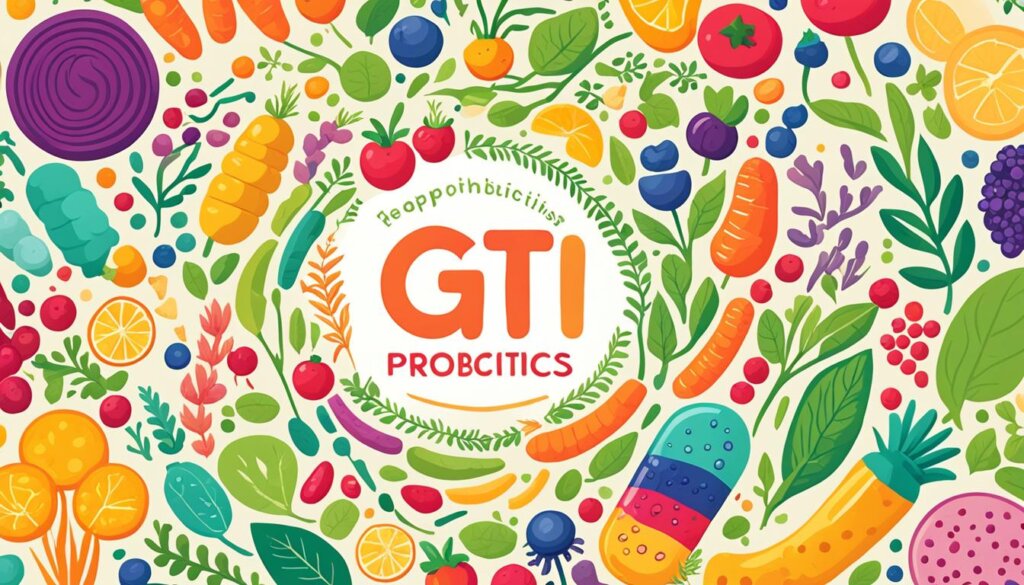
Gut Health and Diet
Eating well is crucial for good gut health. Foods full of fiber such as legumes, grains, veggies, nuts, and fruits are great. They help the good bacteria in your gut to grow well. This makes your gut healthy and diverse.
High-Fiber Foods
Adding fiber to your diet helps your gut a lot. It feeds the good bacteria there. This makes your gut health better and fights off swelling. Eating more fiber also helps keep your bathroom visits regular.
It makes your gut strong and cuts down on swelling too.
Garlic: A Gut-Friendly Food
Garlic is good for your gut and can make your gut bugs more varied. It fights bad bacteria but makes the good ones grow. So, adding garlic to your meals is smart for your gut’s health.
Fermented Foods for Probiotics
Kimchi, sauerkraut, yogurt, and kefir are full of probiotics. Probiotics are live bacteria that help keep your gut well-balanced. Eating more of these foods is an easy way to help your gut.
Collagen-Boosting Foods
Foods with a lot of collagen, like bone broth and salmon skin, are great for your gut. They make your gut’s walls stronger and help good bacteria grow. Try to eat more of these foods for a healthy gut.
Gut Health and Fasting
Fasting seems to help the gut’s tiny world, but we need more info from human studies. In a small 2019 test with 16 people, fasting cut down a bad bacteria known for causing colorectal cancer. Even animals show fasting’s gut benefits. A 2018 study with fruit flies found that fasting makes their gut healthier.
Various intermittent fasting ways, like eating within an 8-hour period, 5:2, and skipping meals every other day, could boost the variety of gut bacteria. For example, men doing a 16-hour fast daily in Ramadan got more of the good Lachnospiraceae.
This can help fight off diseases like cancer and bowel issues. Also, young men who ate as they liked for 8 hours and fasted for 16 saw more types of bacteria in their gut. This included those that signal better health and lower risk of obesity.
On top of that, intermittent fasting helps the gut wall do its job better. It slows the gut’s work and lets the gut’s protective lining heal. This helps battle long-term swelling that hurts the heart and raises diabetes risk.
Adding fermented foods, such as live yogurt, kefir, and kimchi, can up the good bacteria count. And don’t forget about foods high in prebiotics, like onions, asparagus, and whole grains. These will feed the beneficial bacteria in your gut too.
If you want to know more about your gut health and how what you eat changes your bacteria, an at-home test could be the way to go. Check out what ZOE offers. This test can find what helps your gut the most. It can guide you in choosing foods that will make your gut and whole body feel better.
Identifying and Addressing Food Intolerances
Do you get bloated, have tummy pain, or feel sick after eating? You might have a food intolerance. These happen when your body doesn’t like certain proteins in foods. This can cause a lot of issues inside your stomach.
Sometimes, getting a blood test can help find what foods your body doesn’t like. Dairy and gluten are often not well tolerated. But, too much caffeine, certain substances like histamine, and FODMAPs can also be a problem. Figuring out these trigger foods and cutting back on them can make your stomach feel better.
Food intolerances can make your health worse in many ways. Unlike allergies that can be very serious, intolerances mainly bother your stomach.
If you can find and deal with these food troubles, using methods like eating only safe foods for a while and taking special supplements, your stomach could heal.

Gut Health
Your gut health matters a lot. Over half of your immune system is found in your gut. Experts say taking care of your digestive system avoids serious sickness. A balanced gut can boost your body and mind health.
You have about 200 types of bacteria, viruses, and fungi in your gut. More bacteria variety may lower diabetes, IBD, and arthritis risks. The links between gut and mental health, among others, are strong.
Eating too many processed and sugary foods is bad for your gut. Too much sugar can cause body-wide inflammation, a red flag for diseases. Sudden weight changes without diet changes hint at an unhealthy gut.
Gut bacteria balance affects sleep quality and fatigue levels. Skin issues like psoriasis and autoimmune diseases could tie back to gut health. Lactose intolerance might be due to poor gut bacteria quality.
High stress can harm your gut, messing with hormones and immunity. Sleeping poorly can also wreck gut health. Eating slowly and well-chewed food combat obesity and diabetes risks, keeping your gut happy.
A prebiotic or probiotic might boost your gut, but choose them wisely. Foods rich in fiber, like legumes and veggies, are great for your gut. Garlic and fermented foods help your gut’s flora, as do collagen-rich items.
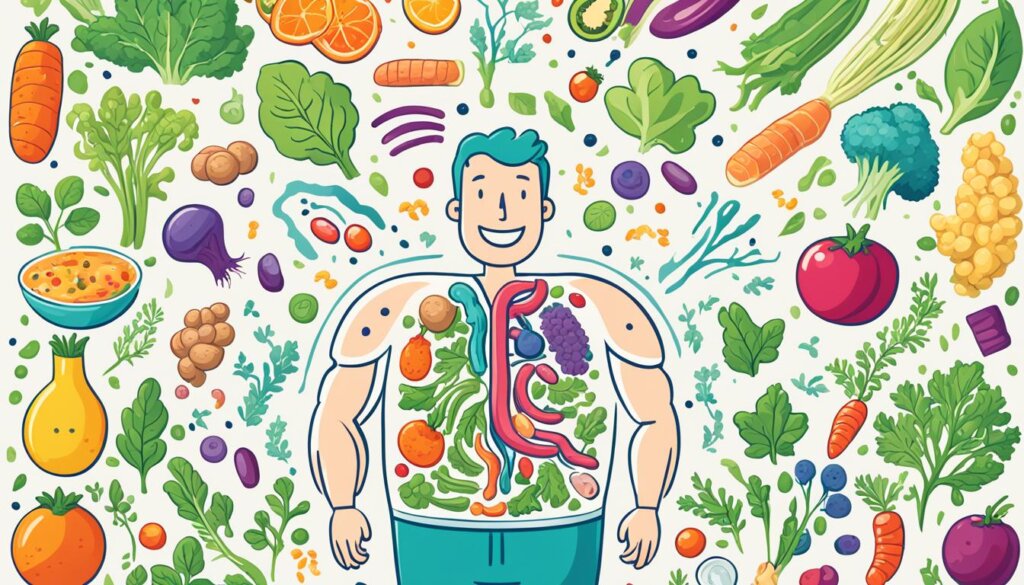
Conclusion
Improving your gut health through lifestyle changes is key. Focus on stress management and getting enough sleep. Think about what you eat with mindful eating and drink plenty of water. Include foods like probiotics, prebiotics, and high-fiber options in your meals.
Doing this can make your gut healthier and lower the chance of health problems. If you have ongoing gut issues, talk to a doctor.
Our guts have trillions of tiny organisms in them. Bad eating habits, stress, using antibiotics, and some conditions can mess up this balance. It’s important for your gut to be diverse and strong for good health.
Change your life and eat more foods that help your gut. You might lessen the risk of getting diseases like type 2 diabetes, inflammatory bowel disease, or being obese.
Dr. Ram C Soni in Faridabad talks about how the gut affects our minds. Eating foods high in fiber, whole grains, fruits, and veggies makes a better mix of creatures in our gut. Moving your body and managing stress also help your gut. Try these things to get a better gut health and feel better all over.
FAQ
What is the gut microbiome?
The gut microbiome is a community of tiny organisms in your digestive system. These include bacteria, viruses, and fungi. Each person hosts about 200 various types of these organisms.
Why is a healthy gut microbiome important?
A good gut health links to multiple diseases like autoimmune and heart conditions. It can even impact your mental health positively. Having a diverse set of gut bacteria boosts your overall mental and physical well-being.
What are the signs of an unhealthy gut?
Signs of an unhealthy gut range widely, from stomach upset to skin problems. You may experience bloating, constipation, or even fatigue. It can also lead to issues with food and autoimmune diseases.
How can I improve my gut health through lifestyle changes?
To enhance your gut health, try managing stress and getting enough sleep. Eating mindfully and drinking plenty of water are also key steps.
What are probiotics and prebiotics, and how can they benefit gut health?
Probiotics are beneficial bacteria, and prebiotics help them grow. Using supplements or foods high in these can improve your gut. It’s wise to talk to a doctor before starting any supplement regimen.
How does diet affect gut health?
Foods like fiber, garlic, and fermented foods can boost your gut’s health. On the flip side, processed foods, high-fat items, and refined sugars are harmful. A balanced diet is crucial for a healthy gut.
Can fasting benefit gut health?
Fasting might help your gut, but more research in humans is necessary. Studies on animals show that fasting can improve their gut health.
How can I identify and address food intolerances?
If certain foods make you feel unwell, you might have a food intolerance. Try cutting out common triggers to see if it helps. This process can help pinpoint your specific food intolerances.



